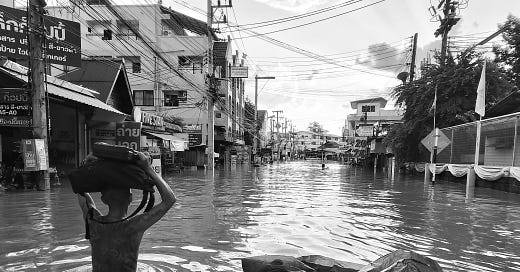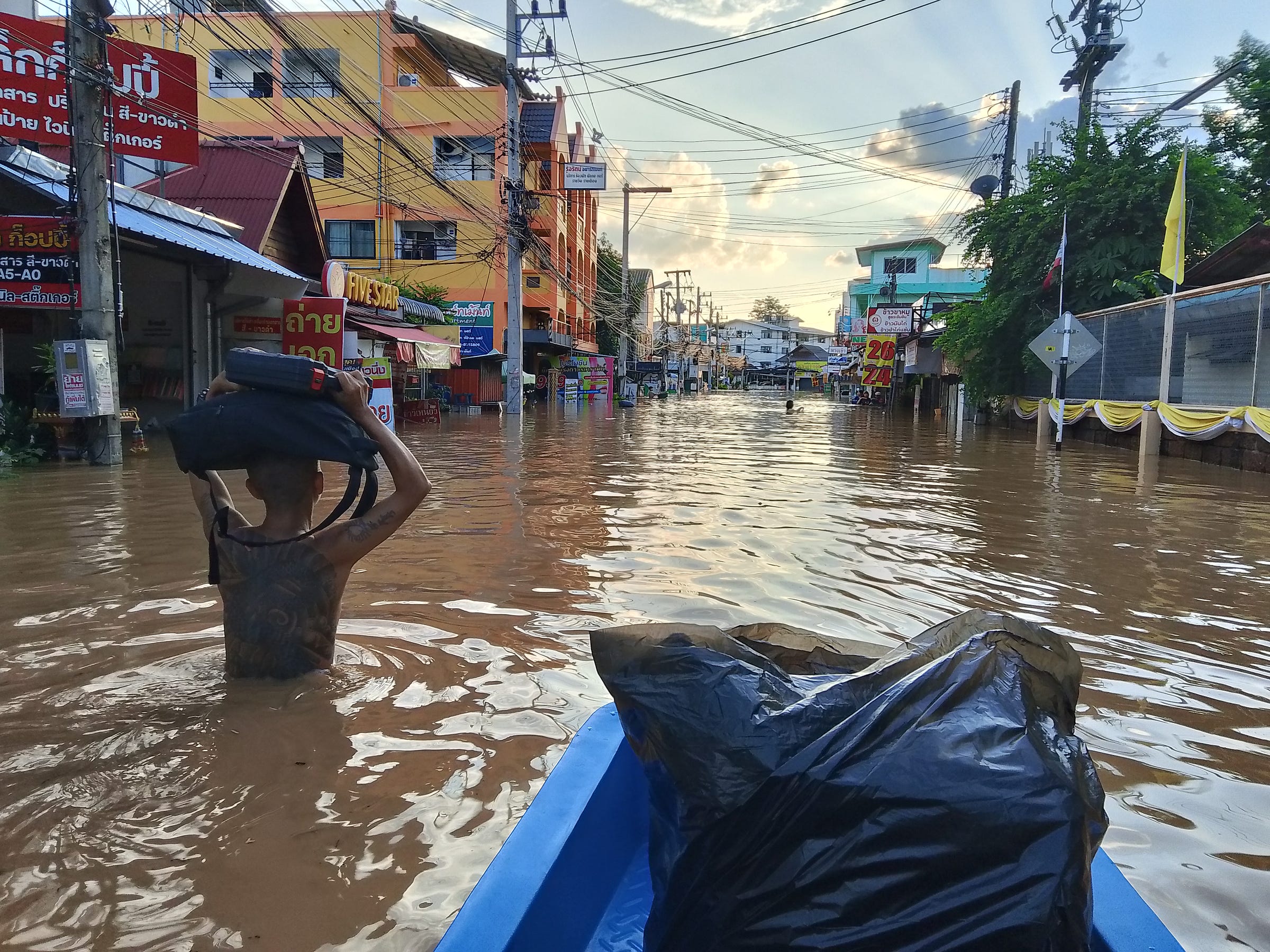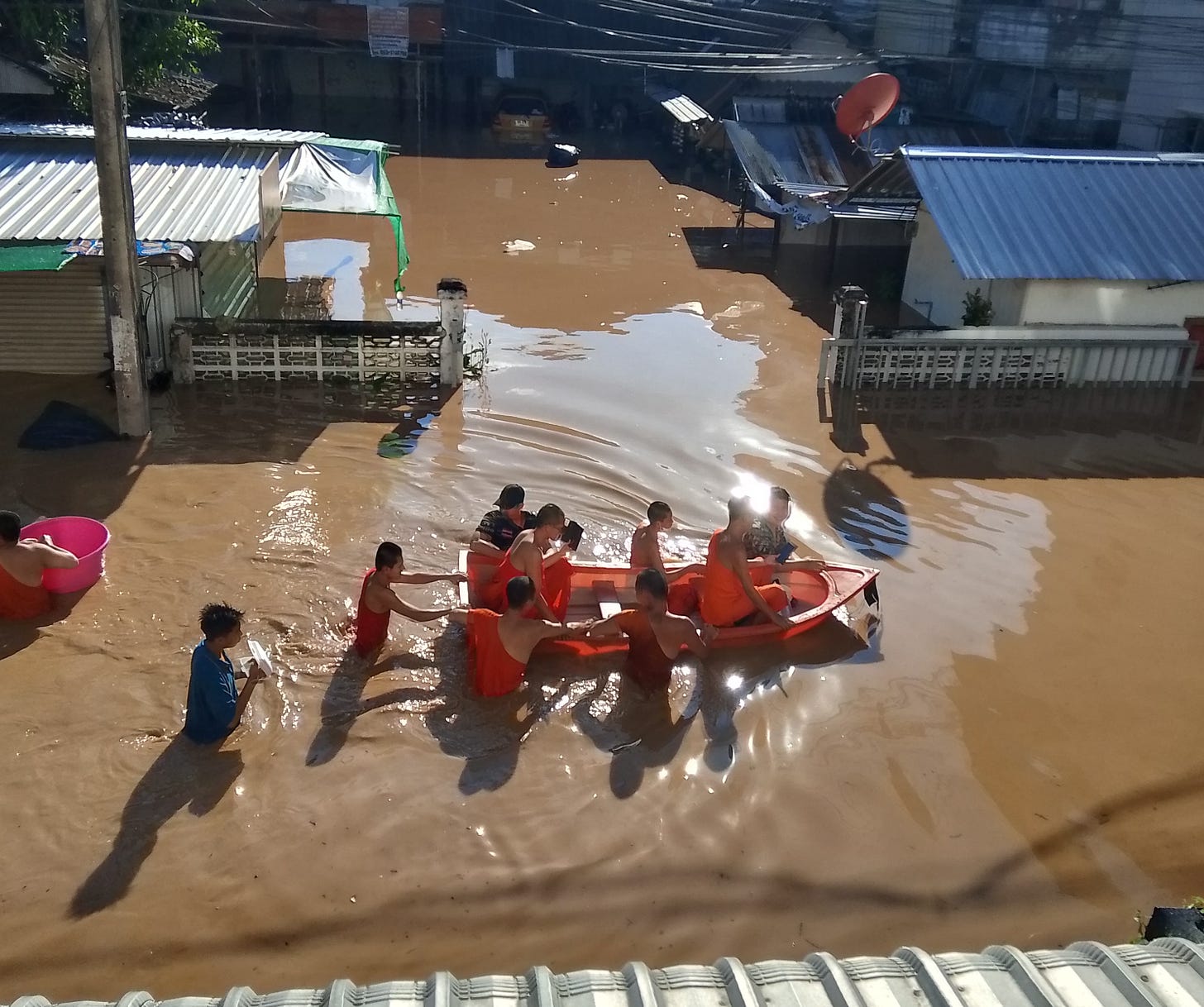Chiang Mai is flooded, and so is my heart
Joy and community amidst the flooding in Chiang Mai
This is the latest of many personal dispatches on culture, healing, and spirituality from a dual Canadian-American living in Thailand. Find popular free essays here and access the rest of PERFECT HUNGER (including The Practice and Link-Ups) by upgrading here:
This is a special edition of the My Soulful Life series written in real time, as events were unfolding. The first section offers a snapshot from the flooding in our neighborhood; I wrote it while awaiting evacuation by boat. The second section offers a snapshot of what came after.
Oof, you all. It’s been a wild few days. Over recent weeks, we’ve had flooding on and off in northern Thailand. I hear it’s due to the Soulik and Yagi typhoons, widespread torrential rain, and, in Chiang Mai, flooding of the Ping River.
The working class neighborhood where we live has gotten it pretty bad (and folks in the countryside and other parts of Thailand have gotten it worse). The first few times our area flooded made for adventurous but still manageable trips in and out: wading to the outdoor market where we shop for food, wading past that and onto dry land so I could get to Thai language school, carrying everything (bags of cat litter included!) in our arms and strapped to our backs, since no cars could reach us.
We adapted rather quickly and, with so much rain, it started feeling routine: put on flip flops, carry shoes and socks in a plastic bag, change into them after reaching dry ground, go about my day, return and switch shoes again before wading back home.
But the flooding that began yesterday is different, which brings us to today.
Saturday, 3 p.m.
The water outside our front door is past my waist and still rising. It’s contaminated with motor oil and garbage and, likely, sewage. Our toilets don’t flush. Power is sometimes on, sometimes off. The Thai military is sending boats to evacuate the oldest and youngest.
From what I’ve seen online, much more of the city is flooded than previously—before, it felt like it was contained in our little corner; now, even some fancy, touristy areas are under water.
As I write this—without internet, on my laptop, willing the battery to last—murky, brown water has breached our entry and is filling the first floor. Because the military is (understandably) tied up helping older people and kids, our landlord is running around town trying to buy a boat so she can get our cats and us out.
Yet, amidst it all, my heart feels full.
Don’t get me wrong—the situation is heartbreaking in my neighborhood and much worse in surrounding areas and parts of the countryside. I imagine that our landlord and most if not all of our neighbors will face massive material losses. Many of them not only have homes and families here, but also home-based businesses.
The family next door rises at dawn and spends all morning, every morning making and smoking Thai meatballs to sell at the markets. The ground floors of nearby homes function as bodegas stocked with fish sauce, instant coffee, and other essentials. The makeshift motorcycle repair shop across the street is bustling morning til night. One street over is lined with small, open-air restaurants, a muay Thai studio, a copy shop frequented by students, local food vendors, our favorite fried chicken guy. Everything at street level is dedicated to commerce; everything above is a residence—including for those who work down below.
In all sorts of ways, people’s lives and livelihoods are centered around these few blocks. In all sorts of ways, people’s lives are being upended. And yet, the scenes in the street right now…just, be still my heart.
I wish you could see the view from my window. There are men and women of all ages wading through waist and chest-deep water to reach the market and bring back as much food as they can carry. There are people using large plastic tubs as boats or pushing others seated in tubs (a few of them singing!). There’s our neighbor who rescued his beloved potted plants by placing them in a basin, sending them down the road-turned-river, and setting them free. There’s the man who, without hesitation, dove under the muddy brown water to rescue a Gen Zer’s dropped phone (even though they appeared to be strangers). There are people singing and smiling and greeting each other with what I swear sounds like joy in their voices.
Gin khao rue yang? “Have you eaten, or not yet?” Outside my window, I hear a neighbor exclaim the common Thai greeting with her usual enthusiasm and cheer. Typically, you might translate it as, “Hello! How’s it going?” Today, its original, more literal meaning is a reminder that, “We’ve got you. We’ll invite you in and we’ll feed you.”
Bpai nai maa? “Where have you been?” Another common greeting, one street over. Its essence: Welcome home.
Sabai, sabai! “Good, good!” neighbors and strangers cry as they pass each other in the flooded streets. Its essence: well-being, happiness, and inner tranquility.
Down the block, there’s laughter, screams of delight, the sounds of teens splashing. Outside our window, more tubs carrying food and people drift by. Everyone is doing what needs to be done. There’s no hurry, no panic, no rush.
People are looking out for each other and taking care of each other. They’re navigating loss and uncertainty with steadiness and grace, calmness and ease. They’re doing it together, and they’re in it together.
Witnessing this—being part of this—I can’t help but think there’s something essential to learn here.
Later, after midnight.
I’m back, it’s after midnight, sleep is not happening (which I’ll explain in a moment).











